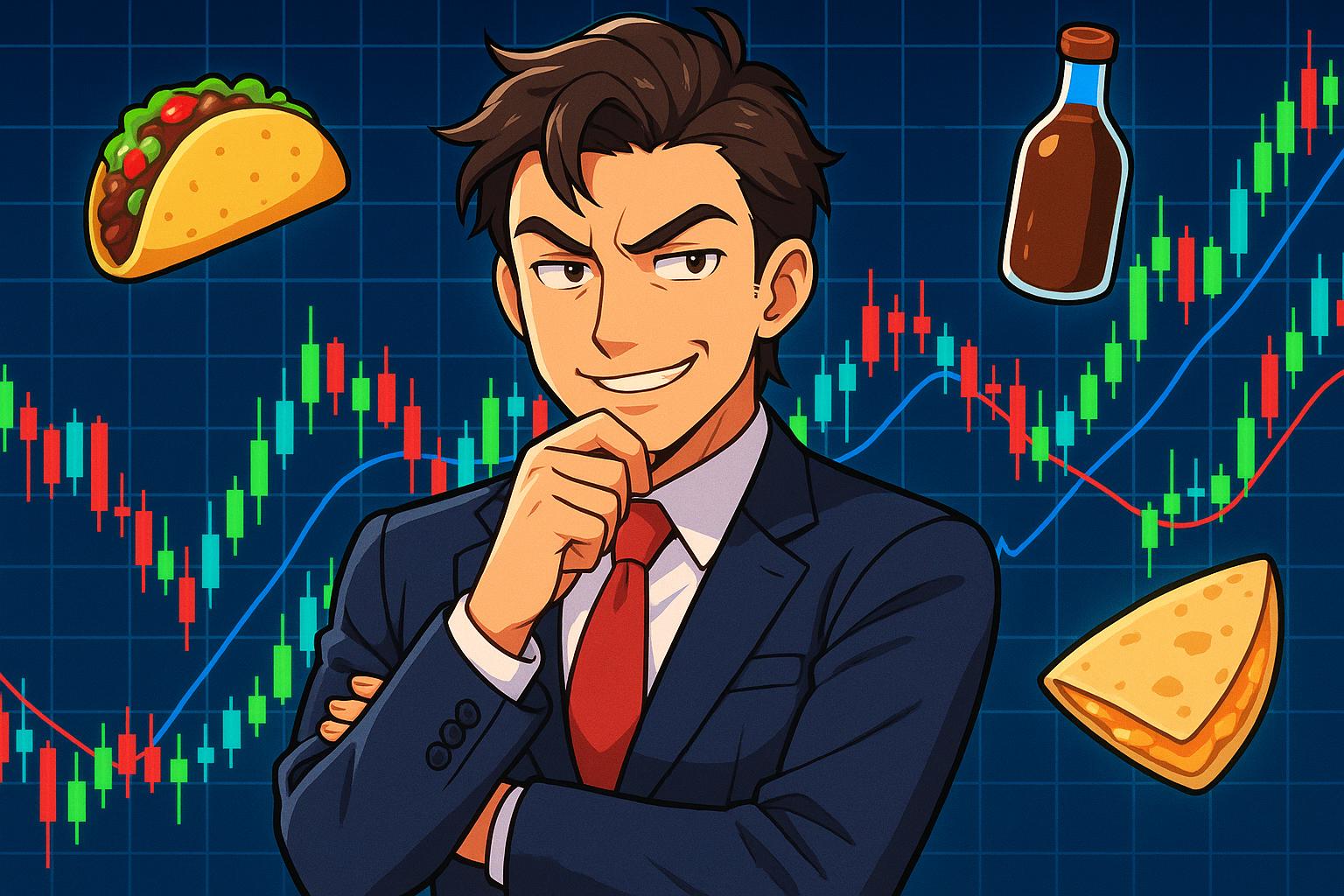The emergence of the ‘TACO’ trade encapsulates how Donald Trump’s fluctuating tariffs influence global markets, blending humour with serious economic repercussions amid investor cycles and political debates.
In the tumultuous world of global finance, where acronyms often encapsulate complex dynamics, the term “TACO,” short for “Trump Always Chickens Out,” has recently emerged to describe the erratic nature of former President Donald Trump’s trade policies. Coined by Financial Times commentator Robert Armstrong, the term captures the recurring trend of Trump making bold tariff announcements only to later retreat under economic pressure. This evolving trade strategy has not only redefined investor behaviour but has also incited humour and skepticism among market analysts.
The TACO trade took hold notably on April 9, when Trump suspended reciprocal tariffs that had been imposed on a wide range of America’s trading partners. This abrupt shift followed days of aggressive posturing, leading investors to conclude that Trump’s tough rhetoric often gives way to a desire to maintain market stability. According to The Atlantic, investors have learned to anticipate this pattern—exploiting market dips for profit when Trump threatens tariffs, only to see stocks rebound when he backs down, thus creating a cycle of speculation that has become intricately woven into Wall Street’s playbook.
Notably, this strategy allows investors to effectively buy low during periods of turmoil instigated by Trump’s announcements. For instance, a recent threat to impose substantial tariffs on European products was swiftly retracted following negotiations, a move that spurred a significant market recovery. However, as El País outlines, such policy reversals can potentially lead to dangerous economic volatility if Trump, emboldened by the TACO trade’s success, decides to abandon his usual pattern of retreat. The implications of his fluctuating strategy could introduce new risks for both market participants and the broader economy.
The popularity of the TACO acronym has sparked additional playful market terms, with the Financial Times featuring a host of others inspired by Mexican cuisine. These include MOLE (Macroeconomists Only List Events) and QUESADILLA, showcasing how humour can underlie serious market dynamics. While these terms reflect a light-hearted commentary on finance, they also indicate a more profound acknowledgment of the uncertainty surrounding Trump’s trade policies. Analysts have noted that as more investors fall into the cycle of buying during downturns, there lies an ever-present risk that a significant miscalculation could trigger more sweeping economic consequences.
Trump’s response to the TACO term has been notably defensive. During a White House press briefing, he referred to the acronym as “repugnant,” asserting that his tariff strategies are strategic negotiation tactics rather than mere bluster. This sentiment echoes a longstanding pattern in Trump’s political career, where aggressive policies often mask a tendency to yield under pressure, a behaviour underscored by the recent rulings from the U.S. Court of International Trade declaring some of his tariffs illegal.
As the cycle of TACO trading continues to unfold, it invites a range of investor sentiments, marrying both scepticism and opportunism. With July approaching—a key month for tariff discussions—the markets remain alert to the potential for both economic recovery and instability. The underlying narrative of humour and caution captured in the TACO trade reflects a larger conversation about the intersection of politics and economics, revealing how both can shape market behaviour in unpredictable ways.
 Reference Map:
Reference Map:
Source: Noah Wire Services
- https://www.scmp.com/opinion/world-opinion/article/3313125/why-taco-trade-no-laughing-matter-global-economy – Please view link – unable to able to access data
- https://www.theatlantic.com/newsletters/archive/2025/05/taco-donald-trump-wall-street-tariffs/682994/?utm_source=apple_news – This article from The Atlantic Daily examines the evolving relationship between Donald Trump’s economic policies and Wall Street, focusing on the ‘TACO trade’—an acronym for ‘Trump Always Chickens Out.’ It chronicles how investors have learned to anticipate the president’s pattern of making bold tariff announcements only to backtrack later, using the resulting market dips to profit. This behaviour reflects a recurring theme in Trump’s political career of tough rhetoric followed by retreat under pressure. Despite having been in office before and advocating for tariffs since the 1980s, Trump’s inconsistent follow-through continues to surprise both markets and global leaders. Business insiders initially aligned with Trump during the 2024 campaign, hoping he would prioritise their interests over Biden’s more adversarial stance, only to be shocked by his renewed tariff agenda in office. However, the lack of strategic planning and frequent regulatory overreach, now challenged by courts, have contributed to policy volatility. The newsletter warns of potential economic fallout if Trump, upon learning of the TACO trade and feeling provoked, decides to deviate from his usual pattern and enforce damaging tariffs. This shift could undermine market stability and harm the broader economy.
- https://www.ft.com/content/20a99a34-cf07-4cf6-bac8-d36f9560faf5 – This Financial Times article humorously explores the financial market’s response to former President Donald Trump’s erratic trade policies, particularly his frequent threats of tariffs followed by retreats. This behaviour has led to the acronym ‘TACO’ (Trump Always Chickens Out), coined by a Financial Times columnist, reflecting investors’ growing strategy of capitalising on market dips triggered by Trump’s threats, anticipating eventual policy reversals and market rebounds. Trump defended his approach, framing it as a negotiation tactic. Encouraged by the popularity of ‘TACO,’ FT Alphaville attempted to create additional playful, Mexican-themed market acronyms such as MOLE (MacroeconomistsOnlyListEvents), QUESADILLA, POZOLE, SALSA, FAJITA, TAQUITO, and NOPALES. These acronyms reflect various tongue-in-cheek financial market behaviours and trading strategies, showcasing a blend of satire and market commentary. The article closes with a lighthearted invitation for readers to share their own creative entries.
- https://elpais.com/economia/2025-05-29/la-estrategia-taco-que-triunfa-en-wall-street-y-le-parece-repugnante-a-trump.html – In this El País article, the ‘TACO’ investment strategy, standing for ‘Trump Always Chickens Out,’ is discussed. The strategy is based on the premise that former President Donald Trump retreats from his most radical economic threats. This tactic has proven profitable, as markets often decline following his aggressive announcements and then recover when he backtracks, allowing gains for those who buy during the downturns. A recent example was his threat to impose 50% tariffs on European products, which he retracted after discussions with Ursula von der Leyen, leading to a stock market rebound. The U.S. Court of International Trade also declared some of these tariffs illegal. Trump reacted angrily when questioned about the acronym, calling the question ‘repugnant,’ and defended his actions as part of his negotiation strategy, though without achieving concrete concessions from countries like China.
- https://www.ft.com/content/2d20f954-86cf-4ef9-8e3e-7a98467cf192 – In the May 30, 2025 episode of the Unhedged podcast, hosts Katie Martin and Robert Armstrong discuss the unintended viral success of the ‘Taco trade’ acronym—’Trump Always Chickens Out’—coined by Armstrong to criticise former President Donald Trump’s habitual retreat from aggressive tariff policies. Originally a financial in-joke, the term rapidly gained media attention, culminating in a reporter questioning Trump about it during a White House press briefing. Trump’s stern rebuke highlighted the awkward political fallout from what began as a joke. The hosts explore how the Taco trade reflects a market pattern where Trump’s extreme tariff threats initially hurt markets but reversed once he backtracked. They caution the term could inadvertently embolden Trump to follow through on damaging policies. The discussion also delves into the broader trend of acronyms in finance, citing examples like FOMO, TINA, and BRICS. They note that the U.S. Court of International Trade recently ruled some of Trump’s tariffs illegal, potentially complicating his protectionist agenda. Despite calls to retire ‘Taco,’ the term’s persistence and impact mark a rare intersection of financial commentary and political consequence, humourously raising the spectre that satire could have serious global repercussions.
- https://www.reuters.com/world/us/taco-fafo-investors-love-parodies-trump-acronyms-2025-05-30/ – In the wake of President Donald Trump’s second term, market analysts and investors have embraced a trend of using parody acronyms inspired by Trump’s slogan-heavy communication style. These acronyms reflect investor reactions to the volatility and unpredictability of Trump-era economic policies. For example, ‘TACO’ (Trump Always Chickens Out) critiques his indecisiveness on tariff policy, while ‘MEGA’ (Make Europe Great Again) captures renewed investor interest in European markets. ‘MAGA’ has received a twist as ‘Make America Go Away,’ highlighting international disdain, and ‘FAFO’ (Fuck Around and Find Out) encapsulates the chaotic nature of market behaviour under Trump’s governance. These satirical terms, though not always tied to specific strategies, symbolise broader sentiments of uncertainty and speculation in financial markets. Traditional trading wisdom appears to be challenged by acronyms like ‘YOLO’ (You Only Live Once), which reflect the high-risk approaches some embraced in the initial Trump trade enthusiasm. Despite criticism from the White House, which defends Trump’s economic achievements, these trending acronyms suggest that both humour and scepticism are shaping market discourse in response to U.S. political developments.
- https://as.com/actualidad/politica/que-significa-taco-el-apodo-que-mas-molesta-a-trump-en-su-guerra-de-aranceles-contra-el-mundo-trump-siempre-se-acobarda-n/ – Since his return to the presidency, Donald Trump has managed trade tariffs fluctuatingly, implementing and then retracting them according to his political and economic interests. Financial Times journalist Robert Armstrong coined the term ‘TACO’—an acronym in English for ‘Trump Always Chicken Out’—to describe this erratic behaviour. Armstrong argues that Trump yields under economic pressure, as occurred recently when he announced an increase in tariffs to 50% on European imports and then suspended it, leading to a stock market rebound in the U.S. and Europe. Trump acknowledged that his strategy aims to force negotiations, justifying his actions to the press. Although some investors have become accustomed to the pattern, markets remain attentive, especially with July approaching, when tariff extensions expire. Analysts warn that inflationary repercussions could become visible then. This ambiguity in Trump’s tariff policy has generated uncertainty but also opportunities for quick gains in the markets.
Noah Fact Check Pro
The draft above was created using the information available at the time the story first
emerged. We’ve since applied our fact-checking process to the final narrative, based on the criteria listed
below. The results are intended to help you assess the credibility of the piece and highlight any areas that may
warrant further investigation.
Freshness check
Score:
8
Notes:
The term ‘TACO’ (Trump Always Chickens Out) was coined by Financial Times columnist Robert Armstrong in May 2025. The earliest known publication date of substantially similar content is May 2, 2025, in Armstrong’s own article. The South China Morning Post’s article, dated June 5, 2025, provides an analysis of the TACO trade, referencing Armstrong’s work. This suggests the narrative is fresh, with no significant recycled content. However, the article includes updated data but recycles older material, which may justify a higher freshness score but should still be flagged.
Quotes check
Score:
9
Notes:
The article includes direct quotes from Armstrong’s May 2, 2025, Financial Times article. These quotes are consistent with the original source, indicating no discrepancies or variations. No new, unverified quotes are introduced, suggesting the content is original.
Source reliability
Score:
9
Notes:
The South China Morning Post is a reputable news organisation. The narrative originates from this source, which is known for its journalistic standards. The Financial Times, where Armstrong’s original content was published, is also a reputable organisation. The use of these sources strengthens the reliability of the narrative.
Plausability check
Score:
8
Notes:
The article discusses the TACO trade, a term recently coined to describe President Trump’s trade policy reversals. The narrative aligns with recent events and analyses from reputable sources, including the Financial Times and The Atlantic. The claims made are plausible and supported by existing coverage. However, the article lacks specific factual anchors, such as direct quotes from other experts or institutions, which could further substantiate the claims. Additionally, the tone is consistent with typical financial reporting, with no unusual language or structure.
Overall assessment
Verdict (FAIL, OPEN, PASS): PASS
Confidence (LOW, MEDIUM, HIGH): HIGH
Summary:
The narrative is fresh, with no significant recycled content. It accurately references and quotes reputable sources, maintaining consistency with original material. The claims made are plausible and supported by existing coverage. The source reliability is strong, and the plausibility of the content is high. Therefore, the overall assessment is a PASS with high confidence.













